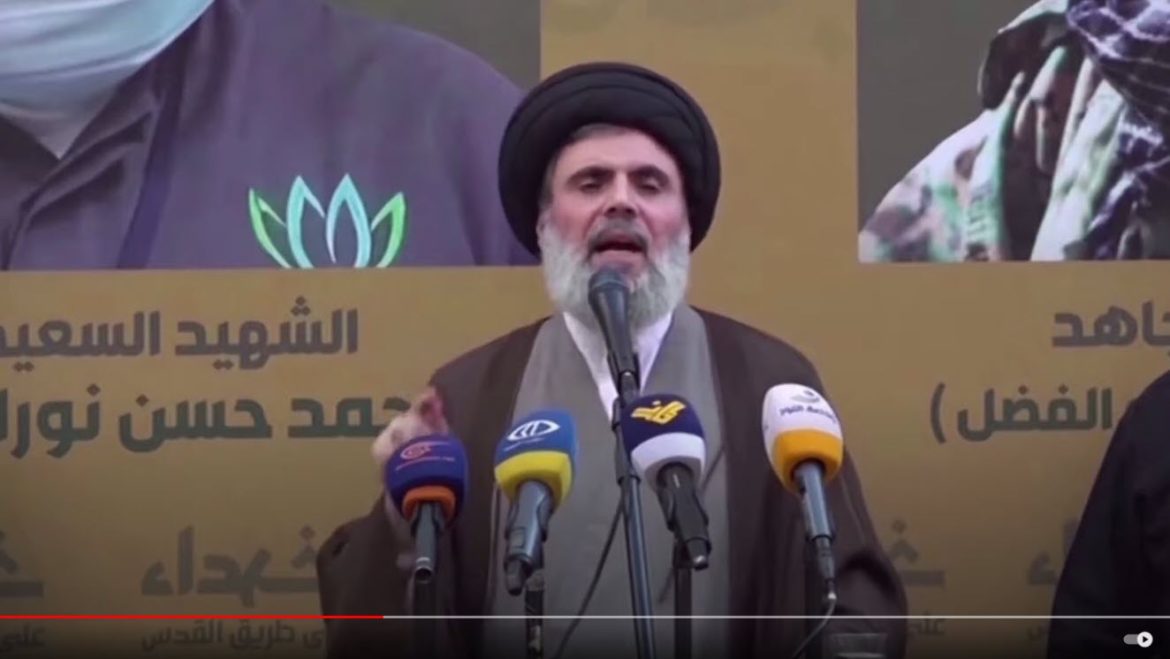Israel is signaling a significant blow to Hezbollah’s leadership, suggesting that the successor to Hezbollah leader Hassan Nasrallah has been killed in recent airstrikes. The Iran-backed Lebanese group now appears to be without a head following the death of Nasrallah’s potential successor, Hashem Safieddine, who has been out of contact since a major Israeli airstrike late last week.
Israel launched a large-scale airstrike on Beirut’s southern suburbs, specifically targeting Hezbollah’s stronghold in Dahiyeh, where Safieddine was believed to be hiding in an underground bunker. Multiple Israeli officials confirmed that the strike, part of a broader campaign against Hezbollah, directly targeted Safieddine. Lebanese security sources reported that the strikes began on Thursday and have since continued, preventing rescue workers from accessing the site to search for survivors.
Safieddine, a high-ranking official within Hezbollah and considered the most likely successor to Nasrallah, has not been heard from since the strike. Hezbollah has yet to confirm his death, but his prolonged silence and the scale of the Israeli offensive have raised concerns within the organization about the possible loss of its top leadership.
The potential elimination of Safieddine comes at a critical time for Hezbollah, which plays a dominant role in Lebanon’s political and military spheres. Hassan Nasrallah has been the face of Hezbollah for decades, but his health has reportedly been deteriorating, leading to increased speculation about succession plans within the group. Safieddine, who is a cousin of Nasrallah, had been widely regarded as the group’s next leader.
If confirmed, Safieddine’s death would leave Hezbollah without an obvious successor, adding uncertainty to the future of the group. Israeli officials, while not formally confirming Safieddine’s death, have implied that the group’s leadership has been crippled. “Hezbollah’s command structure has suffered a significant setback,” one Israeli security source remarked.
Since Friday, Israel has continued launching strikes on Hezbollah strongholds in Beirut’s southern suburb, a densely populated area known for its military and political significance to the group. Lebanese security officials reported that the intensity of the bombardments has made it difficult for rescue teams to access the targeted areas. Several sources have confirmed that Hezbollah members have been frantically searching for Safieddine, though no official word on his condition has been released.
The airstrike campaign is part of Israel’s broader efforts to neutralize Hezbollah’s military capabilities and diminish Iranian influence in the region. Israel views Hezbollah as one of its most significant threats, with the group’s vast arsenal of rockets and deep ties to Tehran posing a direct danger to Israeli security.
Hezbollah has not officially commented on Safieddine’s disappearance or the ongoing Israeli airstrikes. However, Iranian officials, who back Hezbollah both financially and militarily, have condemned the strikes and reiterated their support for the group. Tehran is expected to respond with increased support for Hezbollah in the face of this leadership crisis, but how the group will navigate this potential loss remains unclear.
Nasrallah has not appeared publicly since the strike, further fueling speculation about the status of Hezbollah’s leadership. In the past, Nasrallah has used his speeches to rally his followers and denounce Israeli actions. His silence, along with Safieddine’s disappearance, raises questions about Hezbollah’s ability to maintain its command structure under continued Israeli pressure.
The latest developments mark a dramatic escalation in the already volatile relationship between Israel and Hezbollah. Over the years, Israel has frequently targeted Hezbollah infrastructure in Lebanon and Syria, aiming to prevent the group from acquiring advanced weaponry. However, the direct targeting of Hezbollah’s top leadership signals a new phase in Israel’s military strategy.
Lebanon, meanwhile, is reeling from both the political fallout and the ongoing military pressure. Hezbollah’s dominance in the country’s political scene makes its leadership crisis all the more significant for Lebanon’s stability. The continuing Israeli strikes have also raised concerns about further destabilization in the region, with fears that the conflict could spiral into a larger confrontation.
As the situation develops, Hezbollah’s next moves and any potential retaliation will be closely watched by both regional and international actors. For now, the question remains: with Safieddine likely eliminated, who will fill the vacuum left in Hezbollah’s leadership?



